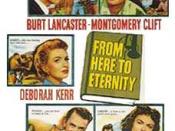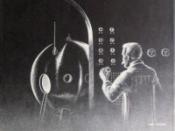From Here to Eternity was a good movie that reflected many aspects of the cultural milieu of the 1940's. Although the movie was viewed by many as one giant soap opera, in relation to the love affairs of Sergeant Warden and Private Prewitt, the love affairs, besides providing romantic cliches, illustrated disillusionment of the 1940's American ideals. The film itself was ground breaking, dealing with subjects never before touched by Hollywood. The 800 page book was extensively toned down by screenwriter Daniel Taradash later awarded with "Oscar" for his effort, yet the picture of the army was so negative that the army refused to co-operate in making the film, the first such incident. The attack of the Japan at the end of the movie also illustrated the true shock of the nation; ill prepared to fight a war.
One of the main themes from the movie From Here to Eternity was the disillusionment with the 1940's version of the American dream, especially for women.
Women ideally were still suppose to be mothers first and foremost. The idea of working women was absurd, especially in light of the fact that it was hard enough for men to hold steady jobs. In 1939, 67% of women approved a bill that would prohibit a woman from working in a business if her husband made more that $1,600 a year. (Gregory, 190) For the wife of an army officer, one of the higher echelons of society, life should have lived up to the highest standards. Yet this is not so, we find out that the Captain himself, is responsible for the death of their child and her sterility when he came home drunk the night Karen Holmes went into labor. The movie has dealt with a very taboo issue and indeed highlighted a shift in social values. In contrast to Karen Holmes, Alma a.k.a. Lorene, works in a "club"ÃÂ for the gentlemen of the island. When Prewitt proposes to her she claims at first that she works a in a club and is a mere step up from the street and would not make a decent wife. Prewitt then pushes arguing that he himself is just a private and even worse social position. At this point Alma's true feelings come out, she wants to make a lot of money then move back to Seattle and build a house for her and her mother. Then she claims that she will live a "proper"ÃÂ life with a proper husband etc., most importantly she describes her life as safe. Alma represents the insecurities of the times the dog eat dog mentality of a lingering depression. A society that just went though a terrifying decade of depression would understandably enter the next with lingering fears. Especially for single women of low social rank and income (i.e. she wants to build a "home"ÃÂ for her mother) who are desperately trying to live a safe life, even if that might entail giving up true love. Alma, however, does not choose a safe life over Prewitt, instead she begs him to stay and be with her, and it is he who abandons her. He however shows unflinching loyalty to the army, which Alma claims, only "killed your best friend and buried your face in the mud."ÃÂ This turn of events is reflective of army culture, the unconditional, unflinching, unrewarding loyalty of the common soldier.
Another theme in, From Here to Eternity, is the highlighted incompetence of the army. Army corruption is rampant, from constant drunkenness, incompetent officers, serial adultery, justice systems etc. The depiction of US Army in this film is nearly anti- army yet historically accurate. Because of the widespread isolationist sentiments and notion of country being safe from invasion, US Army in the first years of WW2, unlike the Navy and Marines, was neglected and small. Made predominantly out of soldiers who had enlisted only to escape poverty and never expected to earn their living in actual fighting, and were inexperienced and under-equipped in comparison with other great military powers of the time. When stationed in tropical tourist paradise the US military succumbed to hedonism from the lack of pride and purpose. A reporter in the Post reported that near 50 percent of the men he interviewed had threatened to desert if not released at the end o their year's obligation. (Gregory, 39) Much of the dissatisfaction came from the incompetence of poor officers. In Captain Dana Holmes, is the perfect stereotype of the incompetent officer. Not only is he responsible for the death of his only child but also is adulterous and neglectful of his wife. He even neglects his troops (his eventual downfall), caring and unfairly favoring only those on his prized boxing team, which he views as his ticket to promotion. Sergeant Milton Warden, the man who basically runs the company says, "That man would drown in his own spit if I didn't swab out his throat."ÃÂ In the real army of pre war 1940's, many officers from the National Guard and the Reserve Officers Corps had scarcely any more training than the troops they were supposed to command. Moreover, they abused the tradition and honor of their rank to the fullest; there are hundreds of accounts of officers lounging around all day in officer clubs while they have "aides"ÃÂ serving as butlers, maids, chauffeurs, and even baby-sitters. The non-comms, which Sergeant Warden represented, indeed had a right to be fed up. Though Warden never says it outright, there is a hint that he is cracking under the weight of the corruption. Therefore, he turns to the outside, particularly the Captains wife for release and excitement. He is risking 20 years of prison for the crime of adultery yet he is supposedly in love with her. Perhaps Warden's discontent was not only perpetuated by corruption of Captain Holmes but also by the influx of the new civilian soldier. In the 1940's, the army draft was re-instated. Career soldiers, barely 10% of them with a high school degree, once ran the army. Then with the influx of the educated civilians, came rampant disrespect of the "stupid"ÃÂ and "ignorant"ÃÂ non-comms. The division between career soldiers and civilian soldiers was very real and often destructive. In, From Here to Eternity, the soldier was shown as a hard drinking and womanizing simpleton. Many of the soldiers in the movie seemed to have a hard time having a good time even if they were on an island paradise. Boredom and depression can be anywhere and no character better captured this better than Private Angelo Maggio when he wailed, "What's the matter with you? Can't a man get drunk? Can't a man do nothin? Can't he put his lousy hands in his lousy pockets on the lousy street? A man has to be hounded all his life. Well, I'm tired. I ain't no criminal. I ain't no coward."ÃÂ Boredom in fact was probably the chief problem of the army. Not only did the soldier face the tedious day-to-day drilling, he also had a shortage of off duty time and satisfying activities when he was free. The two things that kept the "$30 dollars a month soldier"ÃÂ happy were beer and girls. Many communities esp. Hawaii had regulated and well managed brothels and whorehouses. In the original book from which the movie was based on, the character Lorene was a prostitute working in a whorehouse. (Antulov, 3) The rampant corruption and the overall lack of happiness were true reflections of the army's condition.
Even though the movie had an undertone of sadness through out it, there where parts and segments, which inspired patriotism. Sergeant Warden was the ideal NCO of the movie. The only man in the company who had any combat experience. We got the impression throughout the movie that he was dissatisfied. In fact, his hounding after the Captain's wife showed that perhaps he had given up on the army as well. Yet when it comes down to the choice of Karen or the army he chooses the army. When explaining to her his reasoning his wording is awkward, "I didn't put it in. I filled it out but I didn't sign it. I took it out of my desk a dozen times but couldn't sign it."ÃÂ Karen however understands what he is really implying. The Sergeant has just chosen the army over her because he is already married, "married to the army"ÃÂ. The Sergeant has just made himself a hero symbolic of the self-sacrifice and purity of serving the country as a soldier. He also lifts up the millions of men who will soon have to make the same choice he did. To reject all things and become apart of a surrogate family, the army, for a new horrific and grueling war. For Prewitt, the decision is easy, when he hears of the attack there is no hesitation not even after his love Alma promises to marry him. When she ask why he would be so crazy as to risk imprisonment and even death for an institution that treated him so cruelly. His answer is simply, he's a soldier. Not just physically but mentally, to the core. When he is killed, Warden comments on Prewitt to and officer on the scene, "He loved the army more than any soldier I ever knew."ÃÂ Prewitt also reflects the ideal soldier, a "hard head,"ÃÂ a man who will never give up. Other moments in the movie that sparked patriotism was the shot of Warden shooting down a Japanese plane from the roof. Such a possibility in real life was probably next to nothing. The attack on Pearl Harbor was a wake up call and a shock, not only literally to the troops but also to the nation who never expected nor wanted war. The isolationist sentiment always was that if war wasn't sought after then war would come.
All in all From Here to Eternity was a good movie that captured many important themes such as army corruption, social status of women, army ideals, and patriotism in honor of those who served. It was also a good movie in that while incorporating these themes in broke new ground and went against the idea that the 1940's were perfect, a united front against the enemy. The 40's in America had her fair share of problems yet it was these problems that made the victory all that much more significant.





